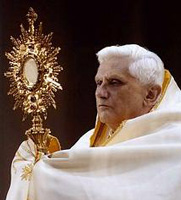Joy To The World

[simpleazon-image align=”right” asin=”B000YRNXV2″ locale=”us” height=”350″ src=”http://ecx.images-amazon.com/images/I/51ikpxDEv7L.jpg” width=”350″]One of the most beloved of all Christmas Carols, especially because of its jubilant tone and mood, “Joy to the World” was composed by one of the most influential Christian musicians in history, the British poet and musician Isaac Watts (1674-1748). “Joy to the World” is based on Watts poetic rewording of Psalm 98, but it is not merely a repetition of the Biblical psalm, but a full interpretation as well. It was first published in 1719 as part of a collection of new Christian hymns written by Watts entitled: “Psalms of David: Imitated in the language of the New Testament, and applied to the Christian state and worship”. Such long titles were typical of the fashion for religious books at the time, but this title also expresses what Isaac Watts considered to be his life work in writing new Christian music.
Before Watts, most Christian singing in church was limited to versions of the Psalms, read and sung rather directly from the text. Watts introduced not only interpretation of the Bible, but references to contemporary life and the human feelings of Christian believers in the modern age. This appeal to personal experience as part of singing was one of the greatest gifts of Isaac Watts to the traditions of singing in Church. Many have suggested that Watts contributed to making Christian singing “contemporary” to his age, and that this is similar to Christians today who update their singing with popular modern forms such as blues and jazz (as in Gospel Music) or even rock music with guitars and drums joining in. In a sense, it all started with Watts. “Joy to the World”, then, contributes to this legacy of relating the Christian message to contemporary concerns and ideas.
While most of the imagery of “Joy to the World” is drawn directly from the Biblical Psalm 98, Watts introduces a Christian interpretation to the celebration of the Psalm, especially noted in the second verse:
Joy to the Earth! the Saviour reigns;
Let men their songs employ;
While fields and floods, rocks, hills, and plains
Repeat the sounding joy,
Repeat the sounding joy,
Repeat, repeat the sounding joy.
Watts relates the celebration of God’s creation to the “reign” of Jesus, and thus not only provides a Christian interpretation of the ancient Hebrew poem, but emphasizes the jubilant mood of the message, and the song, which is certainly one of the main reasons that “Joy to the World” seems to be always sung loudly and with great emotion especially when compared to quieter and more somber Christmas Carols such as “O Little Town of Bethlehem”.
http://www.youtube.com/watch?v=CXY8Vtnrsxc
Joy To The World
Joy to the world, the Lord is come!
Let earth receive her King;
Let every heart prepare Him room,
And Heaven and nature sing,
And Heaven and nature sing,
And Heaven, and Heaven, and nature sing.
Joy to the world, the Savior reigns!
Let men their songs employ;
While fields and floods, rocks, hills and plains
Repeat the sounding joy,
Repeat the sounding joy,
Repeat, repeat, the sounding joy.
No more let sins and sorrows grow,
Nor thorns infest the ground;
He comes to make His blessings flow
Far as the curse is found,
Far as the curse is found,
Far as, far as, the curse is found.
He rules the world with truth and grace,
And makes the nations prove
The glories of His righteousness,
And wonders of His love,
And wonders of His love,
And wonders, wonders, of His love.






